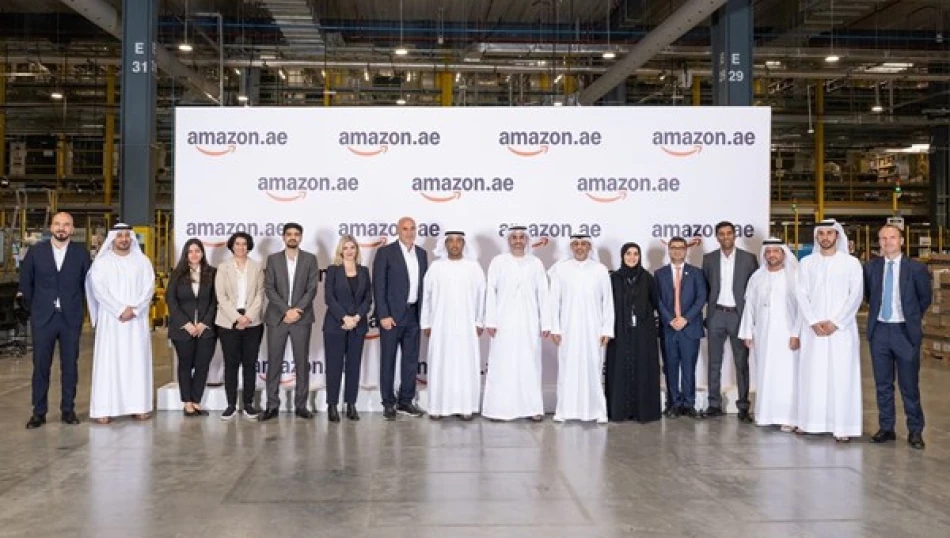
Amazon Unveils First Logistics Hub in Abu Dhabi, Expanding Middle East Footprint
Amazon's Abu Dhabi Logistics Hub Signals UAE's Push to Dominate Regional E-Commerce
Amazon has opened its first logistics center in Abu Dhabi in partnership with the Abu Dhabi Investment Office, marking a strategic expansion that could reshape the Gulf's e-commerce landscape. The facility, capable of storing 8 million units and enabling same-day delivery across the UAE, represents Amazon's deepest commitment yet to the region and positions Abu Dhabi as a logistics powerhouse competing directly with Dubai's established dominance.
Strategic Location Within Economic Powerhouse
The new facility is strategically positioned within the Khalifa Economic Zones Abu Dhabi (KEZAD), leveraging the zone's advanced infrastructure and proximity to key transport networks. This location choice reflects a calculated move to capitalize on Abu Dhabi's growing economic diversification efforts, particularly as the emirate seeks to reduce its dependence on oil revenues.
The center operates 24/7 and houses products across more than 30 categories, from household essentials and kitchen appliances to food items, beauty products, and electronics. This comprehensive inventory strategy suggests Amazon is betting on sustained consumer demand growth in the UAE market.
Technology-Driven Operations Set New Regional Standards
Amazon's Abu Dhabi facility incorporates cutting-edge automation and artificial intelligence systems that have already demonstrated impressive results. The center features an innovation lab that has achieved a 93% success rate across more than 500 tests, while reducing operational processing times by 59%.
The facility is equipped with advanced shipment testing equipment, 3D printing systems, and ergonomic assessment tools designed to optimize operational efficiency. These analytics-driven operations align with Amazon's global sustainability commitments while expanding the company's regional footprint.
Local Business Integration
Approximately half of the logistics center's space is dedicated to local companies and sellers using Amazon's "Fulfillment by Amazon" (FBA) service. This allocation demonstrates Amazon's strategy to build local partnerships while providing UAE businesses with access to its global logistics expertise, potentially transforming how regional small and medium enterprises approach e-commerce.
Market Implications and Regional Competition
This expansion places Amazon in direct competition with regional players and positions the UAE as a logistics hub for the broader Middle East and North Africa region. The move mirrors similar strategies by global e-commerce giants in Singapore and other strategic Asian markets, where logistics infrastructure has become a key differentiator.
For investors and market observers, Amazon's commitment signals confidence in the UAE's digital economy trajectory. The partnership with Abu Dhabi Customs and KEZAD creates a streamlined import-export framework that could attract other international retailers seeking regional expansion.
Government Partnership Strategy
The collaboration involves multiple government entities, including the Abu Dhabi Department of Economic Development, Abu Dhabi Customs, and the Chamber of Commerce. This multi-agency approach reflects the UAE government's coordinated strategy to position Abu Dhabi as a regional smart trade hub, potentially challenging Dubai's traditional logistics supremacy.
Broader Economic Impact
The facility's capacity to enable same-day delivery across the UAE represents a significant infrastructure upgrade that could accelerate the country's digital transformation. For local businesses, access to Amazon's logistics network provides unprecedented opportunities to scale operations and reach international markets.
The timing of this launch is particularly significant as regional governments increasingly prioritize economic diversification and digital economy development. Amazon's investment validates the UAE's positioning as a regional technology and logistics leader, potentially attracting additional foreign direct investment in similar sectors.
This development also reflects broader global supply chain restructuring, with companies seeking to establish regional hubs closer to end consumers. Amazon's Abu Dhabi facility positions the company to serve not just the UAE market, but potentially the entire Gulf Cooperation Council region with improved efficiency and reduced delivery times.
Most Viewed News

 Layla Al Mansoori
Layla Al Mansoori






